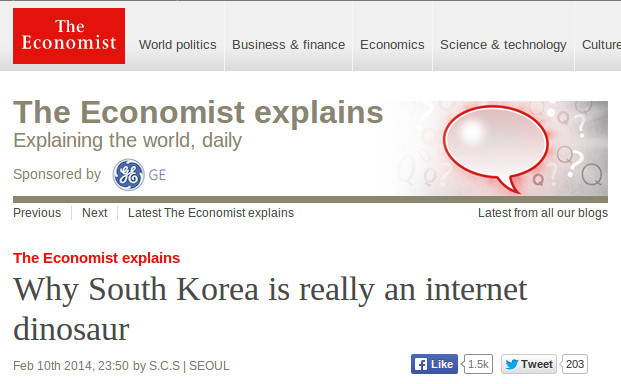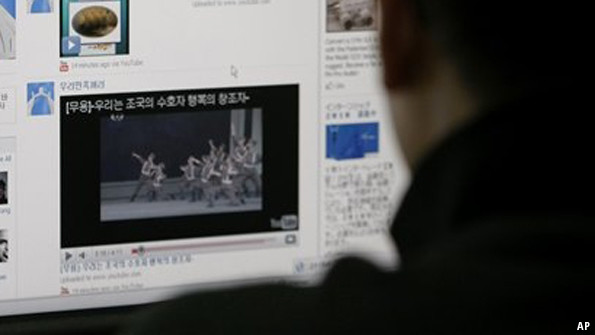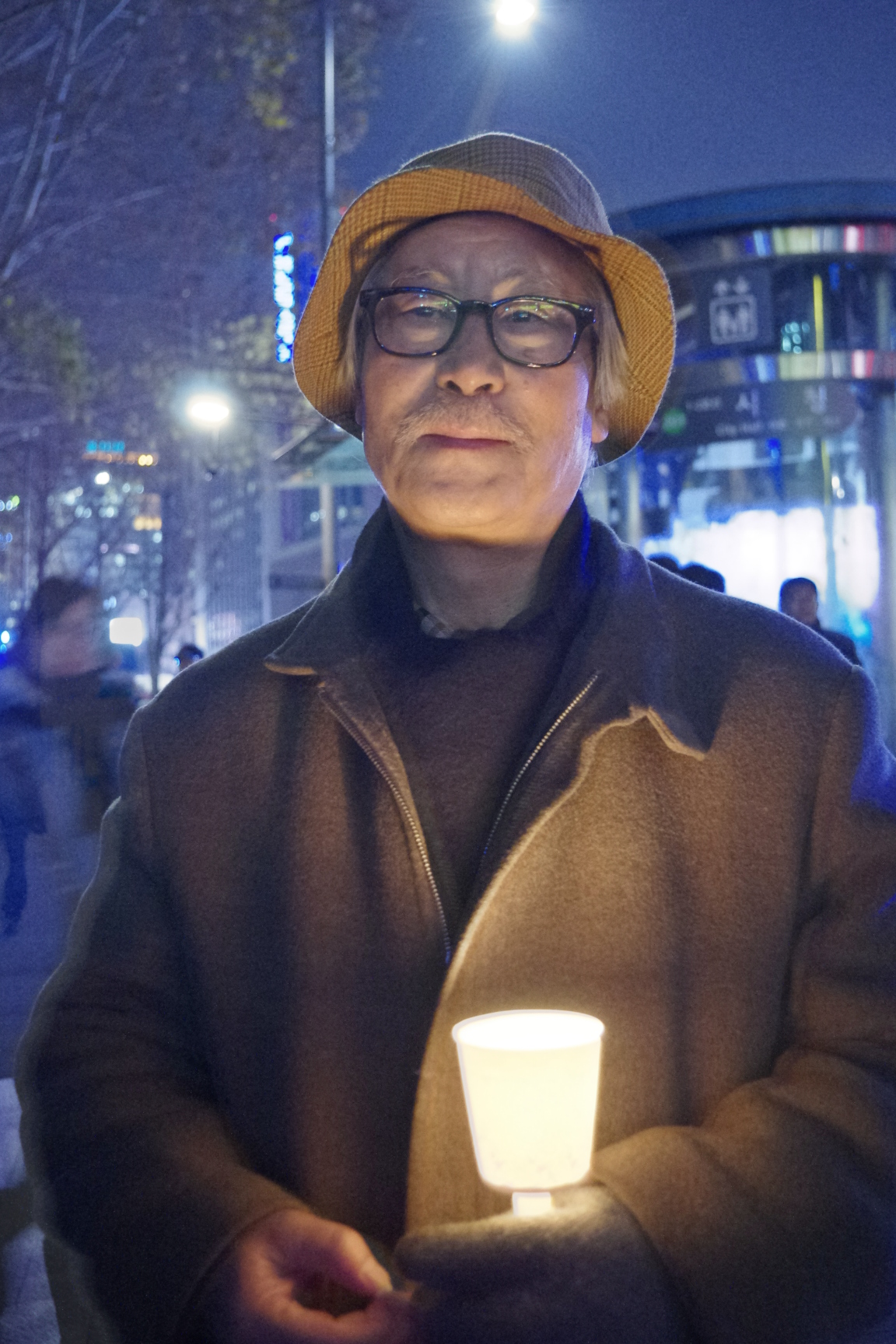|
英 이코노미스트, 한국은 검열 공화국
-인터넷 공룡 한국, 어둠의 시대에 갇혀
-국경 없는 기자회, 감시받는 나라로 분류
영국의 대표적인 경제주간지인 이코노미스트(The Economist)가 한국의 인터넷 환경에 대한 심층 분석 기사를 게재해 주목을 끌고 있다. 특히 이 기사는 한국의 인터넷 환경이 검열과 차단 등으로 인해 어둠의 시대에 갇혀 있으며 과도한 검열과 규제 등으로 인해 미국 비정부기관인 프리덤하우스로부터는 겨우 “부분적 자유”국가로, 국경없는 기자회로부터는 “인터넷의 적들”에 대한 보고서에서 “감시 받는” 나라 목록에 포함 됐다고 보도했다.
‘Why South Korea is really an internet dinosaur-한국이 실제로 인터넷 공룡 (역주: 거대한 공룡처럼 인터넷 초강대국인 한국이 동시에 인터넷 검열, 정치조작을 일삼는 괴물이 된 것에 대한 비유)인 이유’라는 제하의 이 기사는 ‘미래 지향적인 한국이 실제로는 과거로 역행하고 있는가?’라는 질문을 던지며 한국의 인터넷 검열과 규제 상태를 상세하게 전하고 있다. 이 기사는 ‘매주 한국 웹의 일부가 정부의 검열에 의해 끌어 내려지고 있다’며 지난 한해에만 방통위에 의해 ‘23,000개의 웹 페이지들이 삭제됐고 또 다른 63,000개는 차단됐다’고 규제와 차단의 수가 급증했음을 보도했다.
청소년 밤중 사용금지, 북한 관계 사이트 차단은 물론 심지어 지도를 바깥으로 가지고 나가는 것도 금지되어 있다고 보도한 이코노미스트는 2010년 유엔은 한국방송통신심의위원회가 "본질적으로 검열 기관으로서 작동한다"고 결정했다는 사실을 전했다. 이러한 검열에 저항하다 실형을 받은 이들을 소개한 이코노미스트는 심지어 ‘2012년 15세의 한국인 사이버게임 챔피언은 자정이 넘은 시간 프랑스시간으로는 낮에 진행된 “스트크래프트 II” 게임 대회에 참가하던 중 그의 계정이 잠겨버렸다’는 웃지 못 할 사실을 보도하기도 했다.
이어 트윗글과 페이스북의 글들도 광범위하게 삭제당하고 있다고 짚은 이 기사는 ‘한 그룹의 국정원 요원들은 2012년 대선 기간 중 현 한국 대통령 박근혜를 지원하기 위해 가짜 아이디로 수천 개의 메시지를 포스팅한 혐의로 지금 조사를 받고 있다’고 전하며 박근혜는 오히려 ‘12월 철도와 의료 민영화에 대한 국민들의 격렬한 저항을 가리키며 정부는 "SNS를 통해 퍼지고 있는 악성 루머들을 수정할" 필요가 있다’는 발언에 주목하며 SNS 규제 시도를 전했다. 이 기사는 ‘한국인들은 굉장히 빠른 인터넷 연결속도를 즐길지 모르나 그것을 자유롭게 이용하는 것은 허락되지 않는다’고 기사를 매조지하며 한국의 어두운 인터넷 공룡의 모습을 그리고 있다.
다음은 정상추가 번역한 이코노미스트 기사 전문이다.
번역 감수: 임옥
기사 바로가기 ☜
Why South Korea is really an internet dinosaur
한국이 실제로 인터넷 공룡 (역주: 거대한 공룡처럼 인터넷 초강대국인 한국이 동시에 인터넷 검열, 정치조작을 일삼는 괴물이 된 것에 대한 비유)인 이유
Feb 10th 2014, 23:50 by S.C.S | SEOUL
 |
 |
SOUTH KOREA likes to think of itself as a world leader when it comes to the internet. It boasts the world’s swiftest average broadband speeds (of around 22 megabits per second). Last month the government announced that it will upgrade the country's wireless network to 5G by 2020, making downloads about 1,000 times speedier than they are now. Rates of internet penetration are among the highest in the world. There is a thriving startup community (Cyworld, rolled out five years before Mark Zuckerberg launched Facebook, was the most popular social network in South Korea for a decade) and the country leads the world in video games as spectator sports. Yet in other ways the futuristic country is stuck in the dark ages. Last year Freedom House, an American NGO, ranked South Korea’s internet as only “partly free”. Reporters without Borders has placed it on a list of countries “under surveillance”, alongside Egypt, Thailand and Russia, in its report on “Enemies of the Internet”. Is forward-looking South Korea actually rather backward?
한국은 인터넷에 관한한 세계 리더라고 자부한다. 한국은 세계에서 가장 빠른 평균 브로드밴드 속도를 자랑한다 (초당 22 메가바이트 정도). 지난 달 정부는 전국 와이파이를 2020년까지 5G로 업그레이드할 것이라 발표했으며, 이는 다운로드 속도를 현재보다 1000배는 빠르게 할 것이다. 인터넷 보급율은 세계에서 제일 높은 수준이다. 창업 인터넷 사이트도 활발하며 (싸이월드는 마크 주커버그가 페이스북을 창설하기 5년전에 나왔으며 한국에서 십여년동안 가장 인기 있는 SNS였다) 한국은 관람스포츠로서의 비디오게임 분야에서 세계의 선두를 달린다. 하지만 어떤 면에선 이 미래의 나라는 어둠의 시대에 갇혀 있다. 작년에 미국 비정부기관인 프리덤하우스는 한국의 인터넷을 겨우 “부분적 자유”로 평가했다. 국경없는 기자회는 “인터넷의 적들”에 대한 보고서에서 한국을 이집트, 태국, 러시아와 나란히 “감시 받는” 나라들 목록에 포함시켰다. 미래지향적인 한국이 실제로는 과거로 역행하고 있는 중인가?
Every week portions of the Korean web are taken down by government censors. Last year about 23,000 Korean webpages were deleted, and another 63,000 blocked,at the request of the Korea Communications Standards Commission (KCSC), a nominally independent(but mainly government-appointed) public body. In 2009 the KCSC had made just 4,500 requests for deletion. Its filtering chiefly targets ***, prostitution and gambling, all of which are illegal in South Korea. But more wholesome pursuits are also restricted: online gaming is banned between midnight and 6am for under-16s (users must input their government-issued ID numbers to prove their age). Sites from North Korea, including its state newspaper, news agency and Twitter feed, are blocked, as are those of North Korea's sympathisers. A law dating back to the Korean war forbids South Korean maps from being taken out of the country. Because North and South are technically still at war, the law has been expanded to include electronic mapping data—which means that Google, for instance, cannot process South Korean mapping data on its servers and therefore cannot offer driving directions inside the country. In 2010 the UN determined that the KCSC “essentially operates as a censorship body”.
매주 한국 웹의 일부가 정부의 검열에 의해 끌어 내려지고 있다. 지난 해 공공기관인 한국방송통신심의위원회 (명목상으로는 독립적 기관이나 주로 정부에 의해 임명되는)의 요청에 의해 23,000개의 웹 페이지들이 삭제됐고 또 다른 63,000개는 차단됐다. 2009년에는 한국방송통신심의위원회가 단지 4,500건의 삭제 요청을 했다. 여과하는 것은 주로 음란물, 매춘 그리고 도박을 표적으로 하는데, 이 모든 것이 한국에서는 불법이다. 그러나 온라인 게임 같은 더 건전한 오락도 제한되어 있다: 온라인 게임은16세 이하의 사용자에게 밤12시부터 새벽6시까지 사용이 금지돼 있다 (사용자들은 연령을 입증하기 위해서 정부발급 신분증 번호를 입력해야만 한다). 북한의 국가기관지, 통신사, 트위터 피드를 포함한 북한의 사이트들, 그리고 북한을 지지하는 사이트도 차단돼 있다. 한국동란까지 거슬러 올라가는 법은 지도를 나라 밖으로 가져나가는 것도 금지한다. 북한과 남한은 원칙적으로는 아직도 전쟁 중이기 때문에, 그 법은 전자 지도정보까지도 포함하도록 확장돼 있다. 따라서 구글은 서버에 남한의 지도 정보를 처리할 수 없고, 국내에서 운전방향지시 서비스를 제공할 수 없다. 2010년 유엔은 한국방송통신심의위원회가 "본질적으로 검열 기관으로서 작동한다"고 결정했다.
Some Koreans are resisting. In 2011 Park Kyung-sin, a dissenting commissioner, posted a picture of Gustave Courbet’s “L’Origine du monde” on his blog, in protest at the KCSC’s order to block a picture of a man’s genitals—like that found in a science textbook—that he had previously posted on the same blog. He was convicted and fined, though the charges were later lifted. In 2012 a 15-year-old Korean cyber-game champion was locked out of a game of "Starcraft II" while playing after midnight in a competition that was taking place during the day in France. (By the time he reconnected, by entering the details of a parent’s ID card, he had lost the match.) The watchdog has no sense of humour: in 2012 a photographer received a suspended ten-month prison term for retweeting a series of North Korean propaganda posts, likening his inheritance of his father's studio to the North’s leadership transition. Park Dae-sung, a blogger who posted prophecies on the collapse of Lehman Brothers and the crash of the won in 2008 under the pen name of Minerva, spent 104 days in prison for “spreading false rumours”.
이에 저항하는 사람도 있다. 이에 반대하는 박경신 방송통신심의위원은 자신의 블로그에 이전에 올렸던 과학 교과서에 나올 법한 남성의 성기사진을 차단하라는 방통위의 지시에 대한 항의로 2011년 구스타브 쿠르베의 ‘세상의 기원’을 같은 블로그에 올렸다. 그는 유죄판결을 받고 벌금에 처해졌으나, 그후에 무죄를 선고받았다. 2012년 15세의 한국인 사이버게임 챔피언은 자정이 넘은 시간 프랑스시간으로는 낮에 진행된 “스트크래프트 II” 게임 대회에 참가하던 중 그의 계정이 잠겨버렸다. (그가 부모의 아이디로 다시 로그인했을 때는, 그는 경기에 패배해 있었다). 감시단체는 유머감각이 없다: 2012년 한 사진작가는 그가 아버지의 사진관을 물려받음을 북한의 권력승계에 비유하며 북한의 선전문구를 리트윗했다는 이유로 10개월 징역형과 집행유예를 선고 받았다. 2008년 레만 브라더스의 붕괴와 원화의 추락을 예측하는 내용을 미네르바라는 필명으로 올렸던 블로거 박대성은 ‘허위사실 유보’로 104일을 감옥에서 보냈다.
Critics spy political interference. In 2004 internet users were required to input their names and ID numbers on political comments in the run-up to an election. In 2009 those posting any comments on websites with over 100,000 daily visitors were required to do the same. That law has since been rescinded. But although the government is beginning to ease some restrictions, it is stepping up its monitoring of social media. The KCSC set up a special sub-committee on social media in 2011, and the following year asked for 4,500 comments on Twitter, Facebook and the like to be removed—13 times more than in 2010. Last year the number of comments deleted increased again, to 6,400. Some officials seem to enjoy posting rogue comments as well as deleting genuine ones. A group of intelligence agents are now under investigation for allegedly posting thousands of messages under false identities in support of Park Geun-hye, now South Korea’s president, in the run-up to the 2012 election. (There is no evidence that Ms Park had ordered this.) In December she said that the government needed to “correct the wild rumours spreading through social network services”, referring to public outcry at the privatisation of railways and health care. South Koreans may enjoy unusually speedy internet connections, but they are not allowed to use them freely.
비평가들은 정치개입을 감시한다. 2004년에 인터넷 사용자들은 선거 운동 기간 중 정치적인 글 작성시 이름과 ID를 입력해야 했다. 2009년에도 하루 방문자 10만명 이상인 웹싸이트에 글을 남기려면 같은 일을 하도록 요구됐다. 이 법은 그 이후로 폐기됐다. 그러나 정부는 이런 규제를 완화하기 시작했지만 SNS 모티터링은 증가시키고 있다. 한국방송통신심의위원회는 2011년에 SNS 특별 분과위원회를 설치했고 다음 해에는 트위터와 페이스북 상의 4,500개 댓글과 라이크를 삭제하도록 요청했는데 이는 2010년에 비해 13배 이상 증가한 숫자이다. 삭제된 댓글 숫자는 지난해 다시 6,400개로 증가했다. 몇몇 관계자들은 진짜 댓글을 삭제하고 사기성 댓글을 포스팅하는 것을 즐기는 것 같다. 한 그룹의 국정원 요원들은 2012년 대선 기간 중 현 한국 대통령 박근혜를 지원하기 위해 가짜 아이디로 수천개의 메세지를 포스팅한 혐의로 지금 조사를 받고 있다. (박대통령이 이를 지시했다는 증거는 없다.) 12월 철도와 의료 민영화에 대한 국민들의 격렬한 저항을 가리키며 정부는 "SNS를 통해 퍼지고 있는 악성 루머들을 수정할" 필요가 있다고 그녀는 말했다. 한국인들은 굉장히 빠른 인터넷 연결속도를 즐길지 모르나 그것을 자유롭게 이용하는 것은 허락되지 않는다.
|







최근 댓글 목록